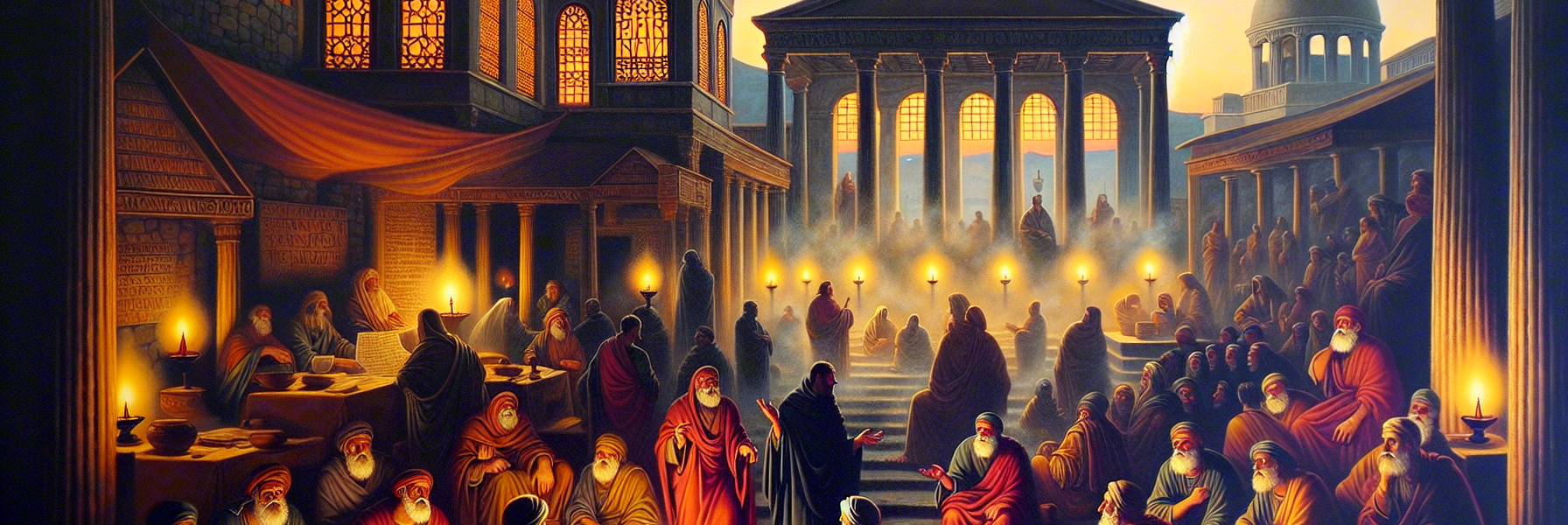**The Faithful Stewards: A Tale of Apostles and Servants**
The sun hung low over the city of Corinth, casting long shadows across the bustling marketplace. The air was thick with the scent of spices, the clamor of merchants, and the murmurs of philosophers debating in the open squares. Among the crowd, a group of believers gathered in a modest home, their faces illuminated by flickering oil lamps as they listened intently to the letter from Paul, their founding teacher.
The reader, a trusted elder named Stephanas, unrolled the parchment and began to speak the words that would cut deep into their hearts:
*”This is how one should regard us, as servants of Christ and stewards of the mysteries of God. Moreover, it is required of stewards that they be found faithful.”*
The room fell silent. These words were not mere instruction—they were a mirror held up to the Corinthians, revealing their pride, their divisions, their misplaced allegiances to this teacher or that.
### **The Measure of a Servant**
Paul’s letter painted a vivid picture—one of apostles not as kings seated on thrones, but as laborers in the fields of the Lord. He reminded them that he and Apollos were nothing more than servants, entrusted with the sacred truths of the Gospel. The true judge was not the fickle opinions of men, but the Lord Himself, who would one day bring to light the hidden things of darkness and reveal the motives of every heart.
A young woman named Lydia, who had once been swayed by the eloquent speeches of rival teachers, bowed her head in shame. She had boasted in one apostle over another, as if the Gospel were a competition. But Paul’s words stripped away her pride: *”What do you have that you did not receive? And if you did receive it, why do you boast as though you did not?”*
### **The Scorn of the World**
The letter continued, describing the harsh reality of the apostles’ lives—hunger, thirst, homelessness, persecution. While some in Corinth lived in comfort, even ruling as self-proclaimed spiritual elites, Paul and his fellow workers were like *”the scum of the earth, the refuse of the world.”*
A wealthy merchant named Gaius shifted uncomfortably in his seat. He had prided himself on his generosity, yet he had also looked down on those who suffered for the faith, as if their hardships were a sign of God’s disfavor. Now, Paul’s words struck him like a hammer: *”We are fools for Christ’s sake, but you are wise in Christ. We are weak, but you are strong. You are held in honor, but we in disrepute.”*
### **A Father’s Warning and Plea**
The tone of the letter softened, but its urgency remained. Paul was not writing to shame them, but to warn them as a father warns his beloved children. He had planted the seed of faith in Corinth, and now he longed for them to grow in humility and unity.
*”I urge you, then, be imitators of me,”* the letter declared. A young believer named Timothy, who had traveled with Paul, nodded in agreement. He had seen firsthand the apostle’s suffering, his patience, his unwavering love for the churches.
Then came the final warning—some in Corinth had grown arrogant, as if the kingdom of God were already fully realized in their midst. But Paul’s words cut through their illusion: *”For the kingdom of God does not consist in talk but in power.”* Would they come in love and gentleness, or must he come with a rod of discipline?
### **The Choice Before Them**
As the letter concluded, the room was heavy with conviction. Some wept. Others sat in stunned silence. The words had done their work—exposing pride, calling for repentance, reminding them of their true calling as servants of Christ.
Lydia was the first to speak. “We have been fools,” she whispered. “We have exalted men, not Christ.”
Gaius stood, his voice trembling. “I will open my home to those in need. No more division. No more pride.”
Stephanas rolled the scroll carefully, his heart full. The letter was not just words on parchment—it was a living word, sharper than any sword, dividing soul and spirit. And now, the choice was theirs.
Would they remain in their arrogance, or would they embrace the humility of the cross?
For as Paul had written, *”What do you desire? Shall I come to you with a rod, or with love in a spirit of gentleness?”*
The answer would determine the future of the church in Corinth.




